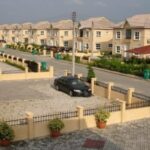Abuja’s property landscape is undergoing a significant shift, shaped by a unique blend of political stability, infrastructure investment, and urban expansion.
Long known as Nigeria’s administrative capital, the city continues to attract government workers, diplomats, and international organizations, creating a consistent demand base that cushions it from some of the volatility seen in other Nigerian cities.
This steady need for quality housing has encouraged developers to innovate, resulting in new residential and mixed-use projects that highlight the most prominent Abuja real estate trends.
Analysts expect these trends to accelerate over the years ahead, positioning Abuja as a focal point for investors seeking resilient returns.
Infrastructure Spending Reshapes the Map
A core driver of today’s Abuja real estate trends is the government’s aggressive infrastructure agenda. The Federal Capital Territory Administration (FCTA) allocated a substantial portion of its 2025 budget to roads, drainage systems, and essential utilities.
Industry experts note that this expansion of road networks and arterial links is already shortening travel times and making suburban areas more attractive to both homebuyers and commercial developers.
New bridges and highway upgrades are unlocking previously underdeveloped corridors, which means once-overlooked districts like Gwagwalada and Kuje are seeing a spike in land inquiries.
This surge is not mere speculation; better transport and water systems significantly reduce construction costs and timelines, a factor that investors track closely when evaluating long-term opportunities.
Price and Rental Dynamics
Property values in Abuja have shown steady growth, with professional market forecasts placing annual appreciation in the 8–10% range for prime neighborhoods such as Maitama and Asokoro.
This trajectory reflects limited urban land availability and robust infrastructure improvements. Rental prices are experiencing even sharper movement. Certain high-demand districts report double-digit year-on-year rental increases, driven by an undersupply of high-quality apartments and the influx of corporate tenants.
These price shows reinforce the ongoing Abuja real estate trends, where well-located properties with ready infrastructure command significant premiums.
For landlords and developers, this environment promises strong yields, but it also raises concerns about affordability for middle-income residents.
The Rise of Mixed-Use and Smart Developments
Another defining feature of the current Abuja real estate trends is the shift toward mixed-use estates and smart-city concepts. Projects like Centenary City and a growing number of privately funded gated estates integrate residential, commercial, and recreational spaces into cohesive communities.
These developments cater to a new generation of buyers who value convenience, digital connectivity, and secure living environments.
Beyond mere housing, these complexes often include co-working hubs, retail clusters, and green spaces, creating micro-cities within the capital.
Such integrated planning appeals to both investors seeking multiple revenue streams and residents who prioritize lifestyle amenities and reliable infrastructure.
Opportunities and Risks for Investors
Investors who focus on mid-market housing that bundles essential infrastructure, roads, drainage, and reliable power, are particularly well-positioned to capitalize on the prevailing Abuja real estate trends.
Properties located near newly funded transport corridors or within established gated communities continue to outperform raw speculative land in both rental yield and resale value.
However, challenges remain. Delays in large-scale project delivery, persistent land-titling issues, and macroeconomic pressures such as currency volatility and high interest rates can derail even promising investments.
Savvy players are responding by conducting deeper due diligence, securing clear titles early, and diversifying holdings across different districts and product types.
What Buyers, Developers, and Policymakers Should Know
For homebuyers, prioritizing locations with completed infrastructure is key to preserving long-term value. Developers are advised to embrace phased mixed-use designs and secure pre-sales or pre-lease agreements to mitigate financing risks.
Policymakers, meanwhile, can sustain positive Abuja real estate trends by streamlining permit processes and clarifying land-use regulations to reduce disputes and delays.
Each group has a stake in ensuring that the market’s growth does not outpace the systems needed to support it, especially as population inflows continue to expand Abuja’s urban footprint.
Outlook: A Market with Momentum
Abuja’s real estate sector stands at a moment of opportunity, powered by infrastructure investments, shifting buyer preferences, and a stable demand base.
The most influential Abuja real estate trends, from rising suburban development to the popularity of integrated estates, are likely to define the next decade of growth. While risks such as financing costs and administrative hurdles remain, investors and residents who align with well-serviced corridors and master-planned communities are well positioned to benefit.
For an international audience of developers, financiers, and policy observers, Abuja offers a vivid case study of how strategic infrastructure spending and urban planning can transform an emerging capital into a dynamic property market.
Frequently Asked Questions (FAQs) about Abuja Real Estate Trends
What factors are currently driving Abuja real estate trends?
The most significant drivers are large-scale infrastructure projects, new roads, bridges, and utility upgrades, funded through the Federal Capital Territory’s 2025 budget.
These improvements reduce commute times and make previously peripheral districts more accessible. Consistent government presence, diplomatic missions, and private-sector expansion also sustain year-round housing demand, ensuring steady market activity.
Which areas of Abuja show the strongest growth potential?
Prime districts such as Maitama, Asokoro, and Guzape remain top performers for luxury properties.
However, emerging suburban zones like Gwarinpa, Kuje, and Gwagwalada are drawing increasing investor interest because improved road networks and lower land costs promise higher percentage returns. These expanding corridors are central to evolving Abuja real estate trends.
How fast are property prices and rental rates rising?
Market analyses indicate annual property appreciation of roughly 8–10% in well-located neighborhoods, with some pockets experiencing even higher rental increases due to tight supply.
Short-let apartments and serviced flats near diplomatic or business hubs command the highest rental yields, reflecting a broader surge highlighted in current Abuja real estate trends.
What types of developments are most attractive to investors right now?
Integrated mixed-use estates and smart developments are gaining traction. These projects combine residential, commercial, and recreational spaces, offering reliable utilities, digital connectivity, and strong security.
Such master-planned communities align with Abuja real estate trends by meeting the lifestyle demands of middle- to upper-income buyers and international tenants.
What risks should buyers and investors watch for?
Despite strong momentum, challenges include land-title disputes, bureaucratic delays in permitting, and macroeconomic pressures such as currency fluctuations and high interest rates.
Investors following Abuja real estate trends should conduct thorough due diligence, verify all land documents, and prioritize developments with completed infrastructure to minimize exposure to these risks.





